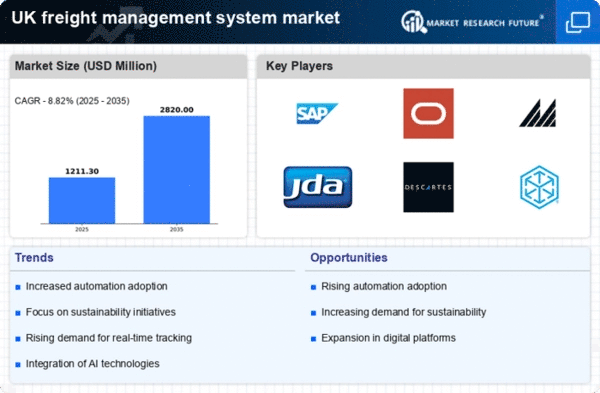E-commerce Growth
The rapid growth of e-commerce is significantly impacting the freight management-system market. With online retail sales in the UK projected to reach £200 billion by 2025, logistics providers are under pressure to enhance their delivery capabilities. This surge in demand for efficient freight solutions necessitates advanced management systems that can handle increased shipment volumes and provide timely deliveries. Consequently, companies are investing in freight management systems to streamline operations, improve inventory management, and enhance customer service. The ability to adapt to the e-commerce boom is crucial for success in the freight management-system market.
Rising Fuel Costs
Rising fuel costs are a critical driver influencing the freight management-system market. Fluctuations in oil prices can significantly impact transportation expenses, prompting logistics companies to seek more efficient solutions. In the UK, fuel prices have seen an increase of approximately 20% over the past year, which has led to a heightened focus on cost management within the freight sector. As a result, companies are increasingly turning to freight management systems that offer fuel optimization features, enabling them to reduce operational costs and improve profitability. This trend underscores the importance of adopting advanced technologies in the freight management-system market.
Focus on Cost Efficiency
Cost efficiency remains a paramount concern for businesses operating within the freight management-system market. As competition intensifies, companies are compelled to streamline their operations and reduce overhead costs. This focus on cost efficiency is driving the adoption of advanced freight management systems that facilitate better resource allocation and operational optimization. By leveraging data analytics and automation, businesses can identify inefficiencies and implement strategies to minimize waste. The potential for cost savings is substantial, with some companies reporting reductions in logistics costs by as much as 25% after implementing these systems. This trend highlights the critical role of cost management in the freight management-system market.
Technological Advancements
The freight management-system market is experiencing a surge in technological advancements, which are reshaping logistics operations. Innovations such as artificial intelligence (AI), machine learning, and the Internet of Things (IoT) are enhancing operational efficiency and decision-making processes. For instance, AI-driven analytics can optimize route planning, potentially reducing transportation costs by up to 15%. Furthermore, the integration of IoT devices allows for real-time tracking of shipments, improving visibility and customer satisfaction. As these technologies become more accessible, companies in the freight management-system market are likely to adopt them to remain competitive and meet evolving customer demands.
Customer Demand for Transparency
In the freight management-system market, there is a growing demand for transparency and visibility in supply chain operations. Customers are increasingly expecting real-time updates on their shipments, which necessitates the implementation of sophisticated tracking systems. This demand for transparency is driving companies to invest in freight management solutions that provide comprehensive visibility throughout the logistics process. By offering enhanced tracking capabilities, businesses can improve customer satisfaction and build trust. As the market evolves, the ability to provide transparent information will likely become a key differentiator for companies operating in the freight management-system market.
















